Retirement Letter From Employer To Employee
[Your Company's Letterhead]
[Date]
[Employee's Full Name]
[Employee's Address]
[City, State, ZIP]
Dear [Employee's Name],
Subject: Retirement and Gratitude
We hope this letter finds you in good health and high spirits. We are writing to officially acknowledge your decision to retire from your position at [Company Name]. Your retirement marks the end of an era, as you have been an integral part of our organization for [number of years] years.
Throughout your tenure with us, you have exemplified dedication, professionalism, and an unwavering commitment to excellence. Your valuable contributions and hard work have played a significant role in the growth and success of our company. We are deeply grateful for your exceptional service and the positive impact you have made on your colleagues, clients, and the entire organization.
As you embark on this new chapter in life, we want to express our sincerest congratulations and best wishes for a fulfilling and joyful retirement. You have earned this opportunity to enjoy more leisure time, pursue personal interests, and spend quality moments with your loved ones. May your retirement be filled with health, happiness, and the realization of all your dreams and aspirations.
In light of your retirement, we want to ensure a smooth transition and assist in any way we can. Our HR department will provide you with information related to the necessary paperwork, final pay, benefits, and any other formalities involved in the retirement process. Additionally, we encourage you to schedule an exit interview to share your valuable insights and suggestions, which will help us continue to improve as an organization.
While we will undoubtedly miss your presence and expertise, we are comforted by the knowledge that you have left a lasting legacy here at [Company Name]. Your contributions will be remembered and cherished by all who had the privilege of working with you.
As a token of our appreciation, we would like to extend an invitation to a retirement celebration in your honor. This event will allow us to express our gratitude and bid you a fond farewell among your colleagues and friends at [Company Name]. Further details about the celebration will be shared with you soon.
Once again, we extend our warmest congratulations on your retirement and express our heartfelt gratitude for your outstanding service. We hope that you will stay in touch and visit us from time to time.
Wishing you a joyful and fulfilling retirement!
Sincerely,
[Your Name]
[Your Title]
[Company Name]
[Contact Information]
Formal Retirement Letter from Employer
Dear [Employee Name],
We wish to formally acknowledge your upcoming retirement from [Company Name] effective [Retirement Date]. It has been a privilege to have you as part of our team for the past [Number of Years] years. Your dedication, commitment, and professionalism have greatly contributed to our success.
We thank you for your outstanding service and wish you a fulfilling and happy retirement. Please consider this letter as our official recognition of your retirement and the commencement of any applicable benefits.
Warm regards,
[Manager Name]
[Position]
[Company Name]
Heartfelt Retirement Email
Subject: Wishing You a Happy Retirement
Dear [Employee Name],
As you prepare to retire from [Company Name], we want to express our deepest gratitude for your years of dedication. Your hard work, wisdom, and camaraderie have left a lasting impact on everyone around you.
We hope your retirement brings you joy, relaxation, and all the adventures you have been dreaming of. You will be greatly missed but never forgotten.
Warmest wishes,
[Team/Department Name]
Casual Farewell Message
Hey [Employee Name],
Congrats on reaching this amazing milestone! Retirement is your time to relax, explore new hobbies, and spend quality time with family and friends. We’ll miss your humor and energy in the office.
Enjoy every moment—you’ve earned it!
Cheers,
[Colleague Name]
Provisional Retirement Notification Letter
Dear [Employee Name],
This letter serves as a provisional notice regarding your retirement, effective [Provisional Date]. Pending the completion of formalities and verification of all benefits, we acknowledge your intention to retire.
Please ensure all pending documentation is submitted promptly. Further confirmation will follow upon completion of the review process.
Sincerely,
[HR Manager Name]
[Company Name]
Preliminary Retirement Notification Email
Subject: Preliminary Retirement Notification
Dear [Employee Name],
We understand that you are considering retirement in the near future. This email serves as a preliminary acknowledgment of your retirement plans. We encourage you to discuss with HR to finalize details and any benefits entitlement.
Thank you for your continued contributions, and we look forward to assisting you during this transition.
Best regards,
[HR Team]
Funny Retirement Message
Subject: Goodbye Tension, Hello Pension!
Dear [Employee Name],
It’s official—you’re leaving the world of deadlines and meetings behind! Enjoy your newfound freedom, early mornings without alarms, and plenty of time for hobbies that don’t involve spreadsheets.
We’ll miss your quirks and jokes in the office, but mostly your ability to sneak snacks during meetings unnoticed. Have an amazing retirement!
Cheers,
[Team Name]
Simple Retirement Acknowledgment Letter
Dear [Employee Name],
This letter is to formally acknowledge your retirement from [Company Name] effective [Retirement Date]. Thank you for your years of service and dedication.
We wish you all the best in your future endeavors.
Sincerely,
[Manager Name]
What is a Retirement Letter and Why You Need It
A retirement letter from an employer is an official communication acknowledging an employee's retirement and confirming its effective date.
It serves multiple purposes:
- Officially informs the employee about retirement acknowledgment.
- Confirms eligibility for benefits, pensions, or retirement packages.
- Acts as a formal record for HR and company documentation.
- Provides a personal or professional closure for both parties.
It is necessary to maintain legal clarity and to honor the employee’s contributions.
Who Should Send a Retirement Letter
- Typically, the letter is sent by the Human Resources department or the employee’s immediate manager.
- Senior executives may send letters for long-term or high-ranking employees to give it a more personal touch.
- In small companies, the owner or CEO may personally issue the retirement letter.
Whom Should Receive the Retirement Letter
- Directly addressed to the retiring employee.
- Copies may be kept in HR files for official records.
- In some organizations, a notification copy may be shared with payroll to process retirement benefits.
- Optionally, a copy may be sent to departmental colleagues for internal acknowledgment.
When to Send a Retirement Letter
- Upon formal notice from the employee regarding retirement.
- Ahead of the employee’s retirement date to allow benefit processing.
- For provisional or preliminary notifications, it can be sent before official retirement documentation is completed.
- As part of exit formalities or farewell events.
How to Write and Send a Retirement Letter
- Determine the tone (formal, heartfelt, casual) based on employee role and relationship.
- Include essential details: retirement date, acknowledgment, and gratitude.
- Mention any post-retirement benefits or next steps.
- Proofread carefully to ensure clarity and professionalism.
- Send via official email or printed letter, depending on organizational norms.
- Optionally, accompany it with a farewell event or personal note.
Formatting and Style Guidelines
- Length: 1–2 pages maximum, concise but comprehensive.
- Tone: match the relationship—formal for senior roles, casual or heartfelt for colleagues.
- Structure: greeting, acknowledgment, gratitude, next steps, closing.
- Wording: clear, professional, and positive; avoid jargon.
- Mode of sending: email for quick communication, printed letter for official documentation.
- Etiquette: respect privacy, avoid overly personal remarks unless appropriate.
Checklist Before Sending the Letter
- Verify retirement date and employee’s tenure.
- Confirm benefits, pension, and other entitlements.
- Check spelling of the employee’s name and titles.
- Decide on tone and style of the letter.
- Prepare HR or payroll notifications if required.
- Ensure proper signature authority (HR manager, CEO, or manager).
Elements and Structure of a Retirement Letter
- Subject line (if email) or introductory statement.
- Greeting addressing the employee by name.
- Acknowledgment of retirement and effective date.
- Expression of gratitude for contributions and service.
- Information on benefits or next steps (if applicable).
- Closing remarks wishing well for retirement.
- Signature of sender with position.
Common Mistakes to Avoid
- Sending the letter too late, after retirement date.
- Using a tone that is either too impersonal or overly casual.
- Forgetting to mention retirement date or benefits.
- Typographical errors in the employee’s name or title.
- Not sending copies to HR or payroll if required.
- Ignoring the employee’s personal preferences for communication.
Tips for Writing Retirement Letters
- Personalize the letter by mentioning specific achievements or years of service.
- Choose the appropriate tone based on your relationship with the employee.
- Use clear language to avoid ambiguity about benefits or retirement date.
- Keep a copy for HR records and payroll processing.
- Consider sending a follow-up note or organizing a farewell gesture.
- Use templates to save time but always adapt them to the employee’s situation.
FAQ About Retirement Letters from Employers
- Q: Can a retirement letter be sent via email?
A: Yes, especially for prompt communication, but official letters may still be printed. - Q: Should the letter mention post-retirement benefits?
A: Yes, if applicable, but only verified benefits should be included. - Q: Can a casual tone be used?
A: For colleagues or long-term peers, casual or heartfelt tones are acceptable. - Q: Is a signature necessary?
A: Yes, either digital or physical, depending on the mode of delivery. - Q: When is it too early to send a retirement letter?
A: Before official confirmation from the employee or HR verification of retirement plans.

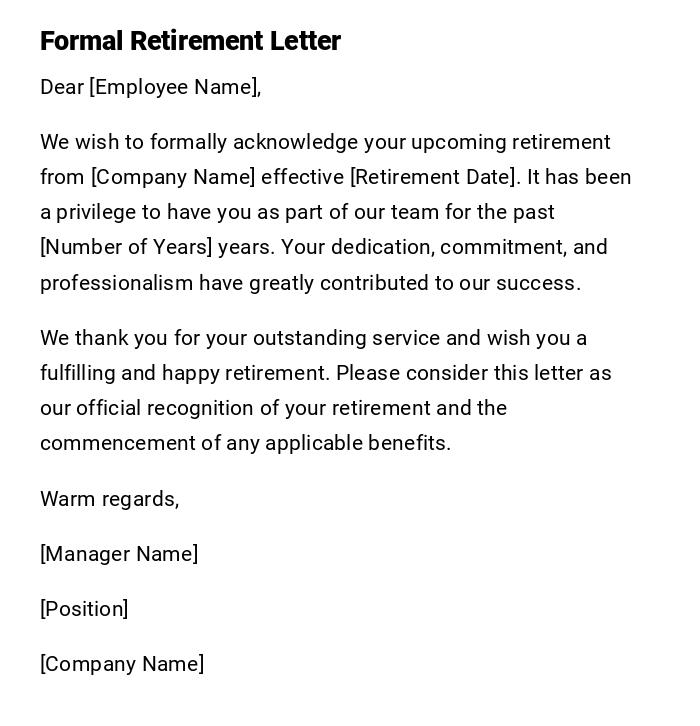
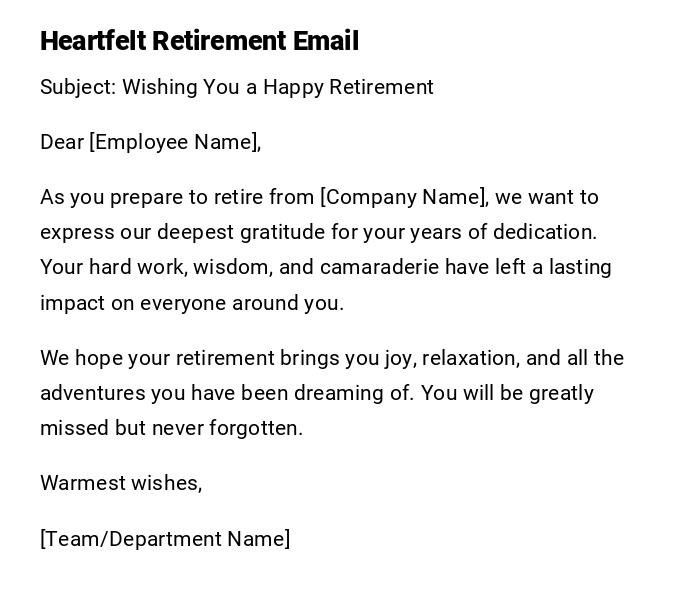
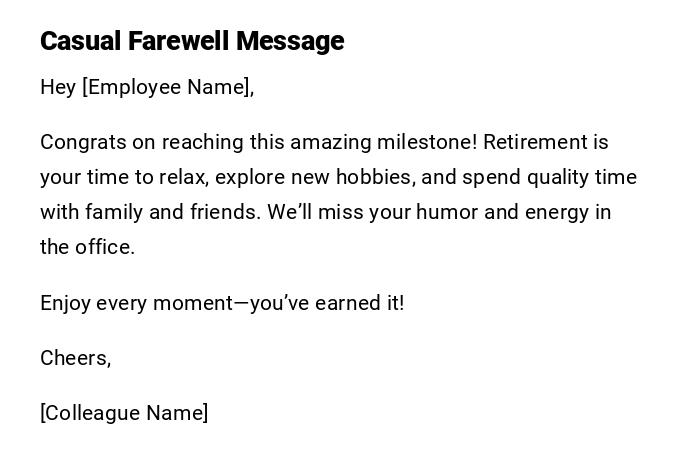
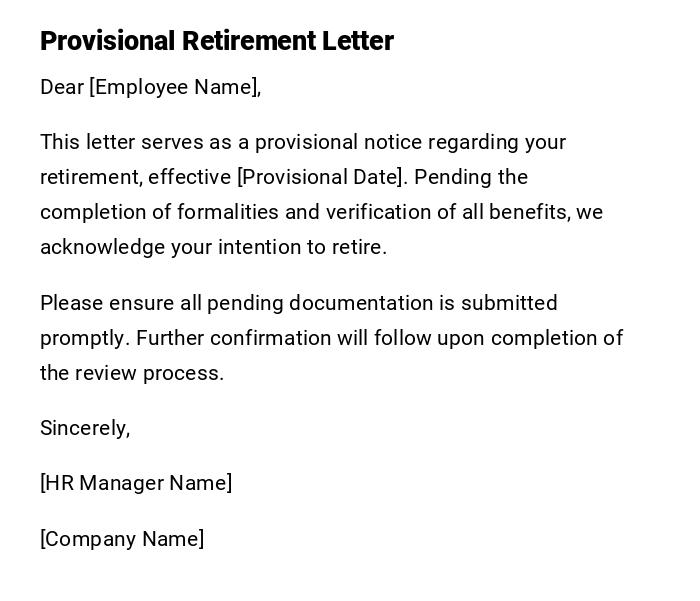
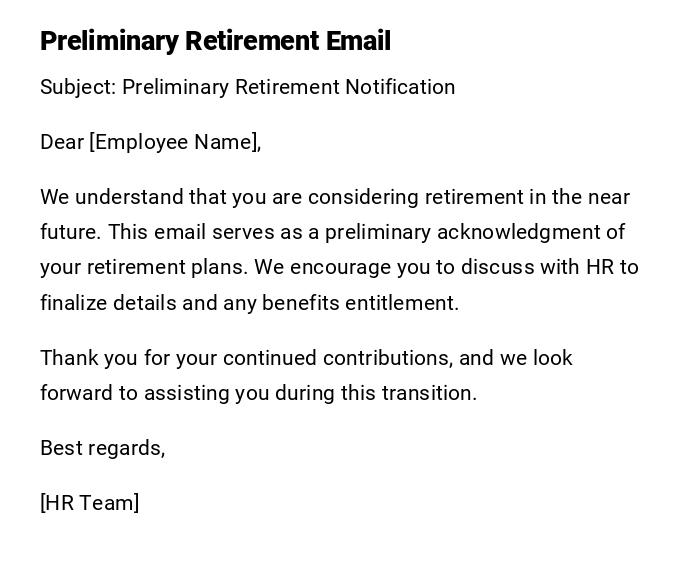
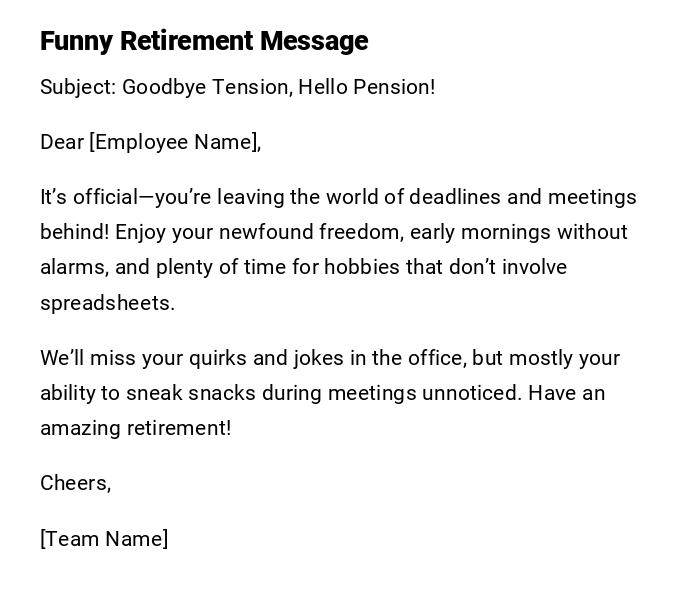
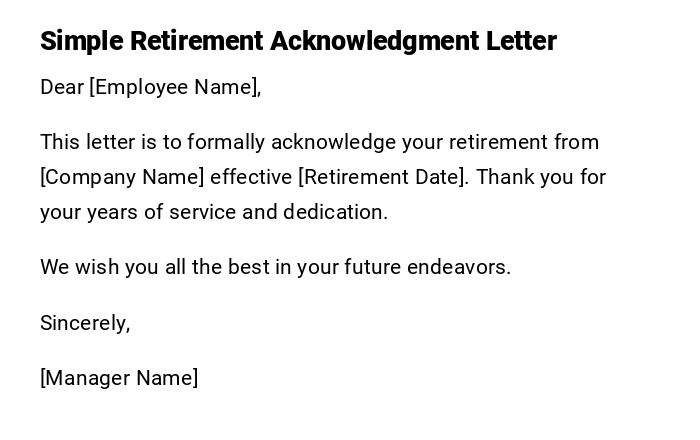

 Download Word Doc
Download Word Doc
 Download PDF
Download PDF